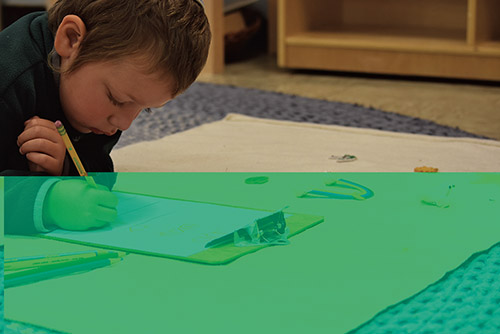

Four year old Tzuri walks towards the Judaics area of the classroom. He scans the shelves and chooses the Parsha Basket work. Carefully, he places the basket on the individual work rug that he unrolled a minute ago. One at a time, he removes each Parsha object and names it in Hebrew, “yonah,… kochav,… shemesh,… keshet,…” He organizes three objects in two rows, one for Parshat Bereishit (star, sun, tree) and another for Parshat Noach (bird, rainbow, ark). Since new objects are introduced for every Parsha, Tzuri and his classmates are likely to choose this lesson every week until the class Siyum.
The most often repeated phrase in early childhood is, “I want to do it myself.” Visitors may initially think that a classroom in which preschoolers are making decisions about when and what they work on would be chaotic. In fact, they observe the opposite: a peaceful and orderly environment of students working. How is this achieved? Children are given freedom within clearly defined limits. The rules surrounding choices are modeled and explained: “we ask for a presentation on a lesson before working on it, we hold trays with two hands, we walk around a friend’s work rug, we take good care of the materials.” Then students can choose work from the many on the easily accessible shelves.
The lessons or “works,” as it is called in Montessori terminology, cover a large range of areas in the early childhood classrooms: practical life, sensorial, math, language and Judaics. All materials, especially the Jewish Montessori ones, are designed to be engaging and are beautifully made. Why is this important? Yehuda HaNasi answered this important question hundreds of years ago when he said,” only the lesson which is enjoyed can be learned well” (Avoda Zara, 19a). Tzuri is presented with a small white dove and not just a picture because the experience of manipulating an object and feeling its size and texture leaves a stronger impression than just looking at a picture. Students feel more capable when practicing their pouring work with small glass pitchers rather than plastic ones. They feel responsible when assigned important tasks such as watering the plants or caring for the classroom pet.
These finer, thoughtfully-prepared details make a difference in how a child views themselves, their classmates, and their learning environment. Not only can a child say, “I want to do it myself,” but after they’ve been given the freedom to do so, they can proudly assert, “I can do it myself.”
Morah Adi Yarmush is the Director of Early Childhood at Yeshivat Netivot.
By Zita Weinstein and Morah Adi Yarmush










